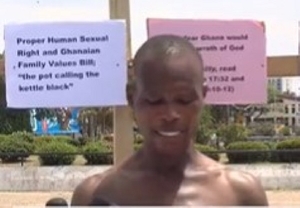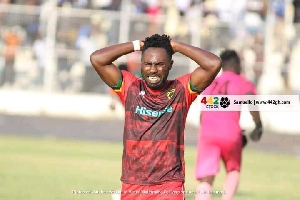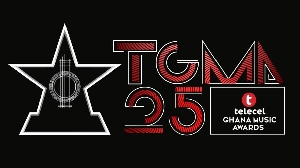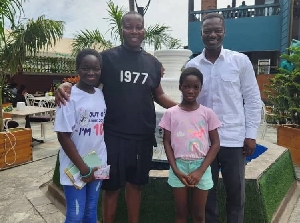Opinions of Friday, 27 May 2011
Columnist: Okoampa-Ahoofe, Kwame
Did Rawlings “Regret” Killing Acheampong and Akufo?
By Kwame Okoampa-Ahoofe, Jr., Ph.D.
In our house, my two toddlers know him simply as “the former Killer-President of Ghana.” And so when I read his latest take on the whirlwind, albeit long overdue, events raging in Libya, my 5-year-old and namesake asked this quite sobering, if also poignantly forthright question: “Daddy, does Rawlings pray for the souls of all the people he killed?” Then, almost as if by way of an epiphany, he quickly added, “Daddy, does the former president of Ghana ever regret that he killed anybody at all?”
Well, I simply responded that the second question would be better posed to the killer-president himself. Needless to say, as I read the Ghana News Agency (GNA) news report in which Mr. Jeremiah John Rawlings was quoted as saying that any attempt by the Western alliance of NATO forces at “Killing [Col. Muammar el Gaddhafy] and his family will be setting a regrettable precedent [in] Africa; and the developing world stand [sic] to lose the most,” I couldn’t stop myself from laughing (See “Killing of Gaddafi Will be ‘Regrettable Precedent’” Ghanaweb.com 5/24/11).
Regrettable precedent, indeed! And then I began to wonder what sort of rascal has been putting such morally grandstanding words into the mouth of the Monster-of-Sogakope these past several weeks. And then this most annoying of annoying sentences, literally, dropped into my laps: “Let us therefore not wait to live with a very regrettable situation,
I was miffed beyond description because I vividly remember then-American president Jimmy Carter, as well as other equally distinguished and respectable world leaders, passionately pleading with then-Flt.-Lt. Jerry John Rawlings to restrain his anger and grant them clemency, even as in thumb-nose fashion, Generals Acheampong, Afrifa and Akufo were cherry-picked by Mr. Rawlings and his AFRC henchmen and summarily executed by firing squad at the Teshie Military Range, in broad daylight and to the voyeuristic glee of their enemies and detractors.
Several days later, the AFRC Abongo Boys would go hunting for five more former military leaders. And by the close of June 1979, eight of the senior-most Ghanaian soldier-politicians hung limp on the execution posts to which they had been crudely lashed. Mr. Rawlings would also rudely issue a riposte to the clemency pleas of President Carter and the other foreign leaders with a placard on which was boldly inscribed: “DON’T MIND FOREIGN INTERVENTION!”
And so, to me, it comes as patently absurd that the same “revolutionary” zealot of yesteryear who “cussed out” rational and harmony-seeking voices like President Carter and Queen Elizabeth II, should be screaming for a merciful hearing in defense of his old friend and “revolutionary mentor.”
It is also rather ironic that whereas he has adamantly and unconscionably insisted that Messrs. Utuka, Boakye, Afrifa, Amedume, Felli, Akuffo, Acheampong and Kyeremeh had to die to cleanse Ghana of leadership corruption of unprecedented proportions, the Butcher-of-Sogakope, on the other hand, envisages the ace Monster-of-Tripoli as a great sociopolitical and moral asset that Africa can ill-afford to lose.
Such psychopathic rant, of course, is not without its own cynical logic. And for those of our readers who may be too young to remember, Col. Gaddhafy was the main arms supplier to both the Rawlings-led Armed Forces Revolutionary Council (AFRC) and the so-called Provisional National Defense Council (PNDC). At the initial unfolding of Mr. Rawlings’ so-called revolutions, never a week passed by without the landing of a Libyan military helicopter or jet at the Kotoka International Airport (KIA). Oftentimes, the arrival of such caches of munitions would be glibly characterized as “Medical Supplies” in news reports.
There was, of course, that famous incident in which Mr. Amamoo Kakra, of GBC Radio 1, had dared to expose the hitherto mysterious Libyan shipments and nearly ended up in the morgue. In the stygian darkness following the foregoing incident, the legendary broadcaster and head of the Akan Section of GBC-1, Mr. Akwasi Donkor, cast the new “revolution”-induced climate in the following dramatic terms: “We live in a time when men have involuntarily assumed the status of women in Ghanaian society, and women have become inarticulate toddlers.”
For his part, the late distinguished Ghanaian historian and ardent political opponent of Mr. Rawlings’, Prof. A. Adu-Boahen, would simply, albeit poignantly, describe the terror-charged reign of Chairman Rawlings as one that eerily marked by a “culture of silence.”
At the initial stages of the proverbial “Arabo-Libyan Spring,” when Mr. Gaddhafy deviously used the pretext of a ceasefire to execute as many rebels as possible, the equally self-delusional Mr. Rawlings, obnoxiously full of his own self-importance, was busy hobnobbing with the Libyan ambassador to Ghana and quixotically pretending as if beyond the geopolitical confines of the people he had terrorized and traumatized for two decades, and counting, anybody gave a hoot about his thoughts and aspirations, or the lack thereof, for the people of Libya.
And precisely what does he mean, when Mr. Rawlings asserts, rather smugly, that “Gaddhafy’s initial threats and actions [against the Libyan people] may have invited [from NATO] this kind of intervention on himself”? The fact of the matter, if the politically deaf Mr. Rawlings really wants to know, is that for some four decades, Mr. Gaddhafy never ceased threatening, torturing and killing any democracy-loving Libyan who called for the Butcher-of-Sirte to make way for a more consensual and civilized method of governance.
But, of course, being himself fundamentally no more than a veritable Gaddhafy clone, nobody expects Mr. Rawlings to envisage the likely suicidal death of Mr. Gaddhafy in terms that are no more “regrettable” than Mr. Rawlings’ own summary execution of nine of the senior-most members of the Ghana Armed Forces, including, of course, the morally and physically intrepid Maj.-Gen. Odartey-Wellington.
*Kwame Okoampa-Ahoofe, Jr., Ph.D., is Associate Professor of English, Journalism and Creative Writing at Nassau Community College of the State University of New York, Garden City. He is a Governing Board Member of the Accra-based Danquah Institute (DI) and the author of “The Obama Serenades” (Lulu.com, 2011). E-mail: okoampaahoofe@optimum.net.
###












